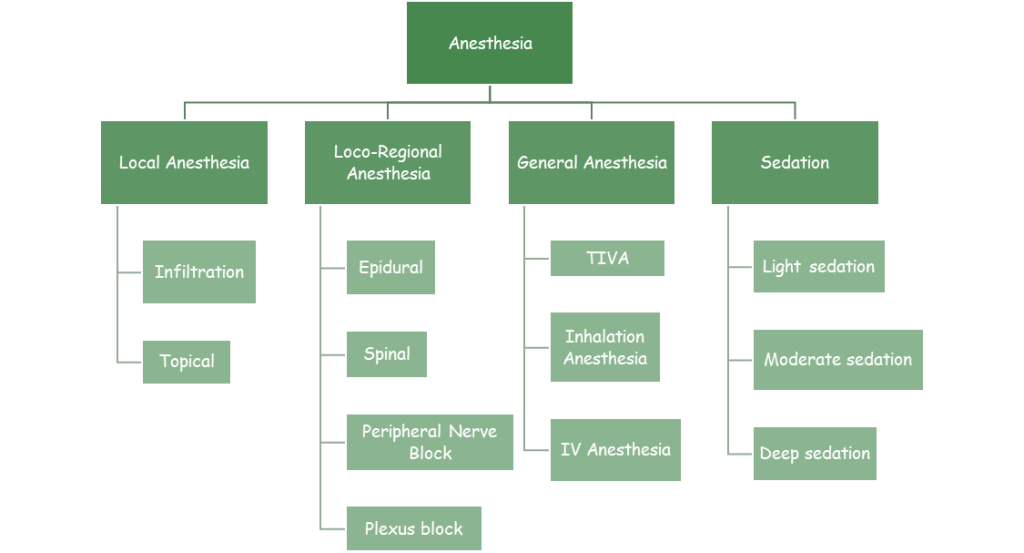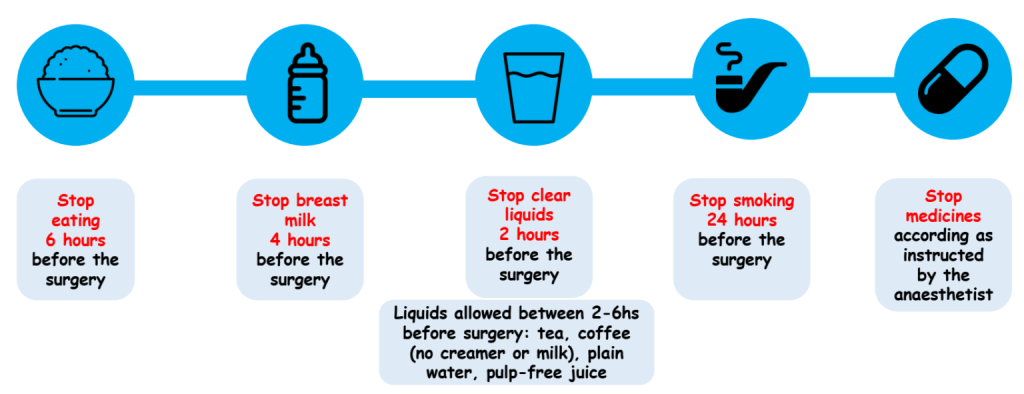The purpose of this page is to inform you about loco-regional anesthesia. This type of anesthesia avoids general anesthesia. You stay awake during the procedure.
- What are the different types of Loco-Regional Anesthesia?

The main types of loco-regional anesthesia include:
– Local Anesthesia: Numbs a small, specific area of the body. Commonly used for minor procedures such as dental work or skin surgeries.
– Regional Anesthesia: Blocks sensation in a larger area. Includes:
a. Nerve/Plexus Blocks: Target specific nerves (e.g., brachial plexus block for arm surgery).
b. Epidural Anesthesia: Injected into the epidural space of the spine, often used for labor and delivery.
c. Spinal Anesthesia: Injected into the cerebrospinal fluid in the spinal canal, used for lower abdominal, pelvic, or lower limb surgeries.
- How does Loco-Regional Anesthesia work?
Nerve block

Loco-regional anesthesia works by injecting local anesthetic agents near specific nerves or into the regional spaces of the body. This prevents nerve signals from reaching the brain, effectively blocking pain in the targeted area. The patient remains conscious but does not feel pain in the anesthetized region.
- What are the common medications used in Loco-Regional Anesthesia?
Common medications include:
* Local Anesthetics: Such as lidocaine, bupivacaine, or ropivacaine, which block nerve impulses.
* Adjuvants: Medications like epinephrine can be added to prolong the effects and reduce bleeding. Clonidine or dexamethasone may also be added to prolong the effects of anesthesia.
- What can I expect during the procedure?
Nerve block

During the procedure:
– Preparation: The area is cleaned and sterilized. For nerve blocks, you may be positioned to access the nerve site.
– Injection: The anesthesiologist will inject the local anesthetic near the targeted nerves or into the appropriate space using an ultrasound machine.
– Onset: You will begin to feel numbness and loss of sensation in the targeted area within minutes.
- What are the risks and side effects of Loco-Regional Anesthesia?
Risks and side effects may include:
– Local Reactions: Pain, swelling, or infection at the injection site.
– Nerve Damage: Rare, but possible if the needle or medication causes injury to the nerves.
– Allergic Reactions: Rare, but possible to the anesthetic agents.
– Systemic Effects: Such as low blood pressure, dizziness, or nausea.
- How do I prepare for Loco-Regional Anesthesia?
Preparation includes:
– Preoperative Assessment during the preanesthetic consultation: Provide information about your medical history, current medications, last blood test results and any allergies to your anesthesiologist.
– Fasting: Follow instructions on when to stop eating and drinking before the procedure: typically 6-8 hours prior the surgery (6 hours for light meals, 8h for heavy meals, 2 hours for clear liquids without milk or pulp).

– Medication Review: Discuss any medications or supplements you’re taking with your healthcare provider. Your anesthesiologist will tell you what medication to stop before your surgery to ensure your safety.
- What should I do after the procedure?
After the procedure:
– Recovery Time: You may need to rest until the effects of the anesthesia wear off. This may take a few hours.
– Observation: The anesthesiologist will monitor you for any immediate side effects or complications.
– Follow-Up Instructions: Adhere to any specific instructions provided regarding movement, activity, and pain management.
- Are there alternatives to Loco-Regional Anesthesia?

Yes, alternatives include:
– General Anesthesia: Induces a state of unconsciousness and is used for procedures that require the patient to be fully asleep.
– Deep sedation
– Local anesthesia
– Other Types of Regional Anesthesia: Such as spinal or epidural anesthesia for different types of procedures.
- Can I choose not to have Loco-Regional Anesthesia?
Yes, you can discuss your preferences and concerns with your anesthesiologist. He will help you understand the best anesthesia option for your procedure based on its type, duration, and your overall health.
- How do I know if Loco-Regional Anesthesia is safe for me?
Your anesthesiologist will evaluate your health history, current medical conditions, and any risk factors to determine if loco-regional anesthesia is appropriate and safe for you.
- Where can I get more information?
For more information, consult your anesthesiologist. They can provide detailed explanations and answer any specific questions you may have regarding loco-regional anesthesia.
By Dr Solène Paul – Anesthesiologist and Intensive Care physician

Your Health is our mission
